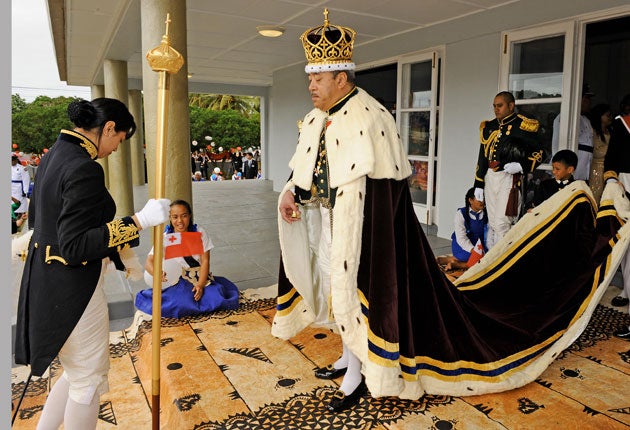King of Tonga bows to history as democracy comes ashore
After years of protests, the world's last absolute monarch yields power

Your support helps us to tell the story
From reproductive rights to climate change to Big Tech, The Independent is on the ground when the story is developing. Whether it's investigating the financials of Elon Musk's pro-Trump PAC or producing our latest documentary, 'The A Word', which shines a light on the American women fighting for reproductive rights, we know how important it is to parse out the facts from the messaging.
At such a critical moment in US history, we need reporters on the ground. Your donation allows us to keep sending journalists to speak to both sides of the story.
The Independent is trusted by Americans across the entire political spectrum. And unlike many other quality news outlets, we choose not to lock Americans out of our reporting and analysis with paywalls. We believe quality journalism should be available to everyone, paid for by those who can afford it.
Your support makes all the difference.The eccentric, monocle-wearing King of Tonga, who has ruled his small Pacific island kingdom with the sort of absolute authority familiar to Louis XIV but in short supply in recent times, is to relinquish his powers. And the man himself is said to be all for it.
King George Tupou V, who is 61, apparently saw the writing on the wall when his coronation had to be delayed for two years to allow pro-democracy riots to die down. He was finally crowned, with white ermine and a very English sort of crown, last year.
He succeeded his father, Taufa'ahau Tupou IV, who was not only hugely popular in his kingdom but attained a degree of fame far beyond it thanks to his huge size. He entered Guinness World Records as the heaviest monarch in the world.
The present King is a somewhat shy, lonely figure and is thought to be keen to retreat from the limelight. Educated at Oxford and Sandhurst, he favours Savile Row suits or, when the occasion demands, a military uniform complete with pith helmet. He is driven around Tonga's main island, Tongatapu, in a black London cab – which, he once explained, was "easier to get in and out of when you're wearing a sword". His hobbies are said to include computer games, toy soldiers and sailing motorised boats in his swimming pool.
If the reforms are implemented, he will remain head of state but lose all his executive powers. And while the monarchy, as an institution, still inspires respect and affection in Tonga, there will inevitably be a question mark over its future – particularly as the King is unmarried, and has no obvious heir.
Pro-democracy campaigners, who have been fighting for reform for years, welcomed the planned changes. Teisina Fuko, president of the Tongan People's Democratic Party, described it as "marvellous". He said, "Tonga can now go ahead and develop a political party system like those seen in New Zealand and Australia."
The reforms, recommended by the country's Constitutional and Electoral Commission, would strip the King of many of his powers, including the ability to appoint the prime minister and ministers. In addition, ordinary Tongans would be able to elect two-thirds of their political representatives. Currently the parliament is stacked with nobles, chiefs and supporters of the royal family.
The changes would represent a seismic shift for Tonga, a former British protectorate consisting of 171 beautiful islands sprinkled across the Pacific Ocean. Under the nation's semi-feudal system, which dates back more than a century, the royal family and aristocracy have always controlled parliament, with the monarch wielding considerable power.
The riots that preceded his coronation, during which eight people died, shocked the normally peaceful nation. Much of the capital, Nuku'alofa, was destroyed, with businesses owned by the King and the Prime Minister, Feleti Sevele, looted and burnt.
The reform process was set off by the previous king, who declared before his death in 2006 that Tonga was ready for a change.
Tupuo V seems to have seen the way the wind was blowing. Even before he was crowned, he announced that he would be relinquishing control of various state enterprises, including an airline, the national electricity provider, a telecoms company, a brewer and the .to internet domain.
One reason that he and his siblings had been unpopular was their ownership of state assets, and the wealth that they derived from them. Prime Minister Fevele, for one, believes that the riots three years ago amounted to an attempted coup d'état.
Join our commenting forum
Join thought-provoking conversations, follow other Independent readers and see their replies
Comments